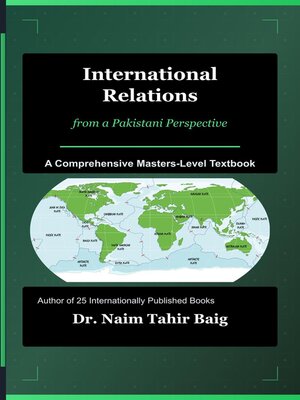
Sign up to save your library
With an OverDrive account, you can save your favorite libraries for at-a-glance information about availability. Find out more about OverDrive accounts.
Find this title in Libby, the library reading app by OverDrive.



Search for a digital library with this title
Title found at these libraries:
| Library Name | Distance |
|---|---|
| Loading... |
BOOK DESCRIPTION
"International Relations from a Pakistani Perspective: A Comprehensive Masters-Level Textbook" by Dr. Naim Tahir Baig represents a groundbreaking contribution to the field of international relations scholarship. This comprehensive textbook fills a critical gap in academic literature by presenting international relations theory and practice through the unique lens of Pakistani experience and Islamic civilization.
Designed specifically for Masters-level students and advanced undergraduate courses, this textbook offers a thorough examination of how Pakistan's strategic position at the crossroads of South Asia, Central Asia, and the Middle East influences global political dynamics. The book combines rigorous theoretical analysis with practical case studies, providing students with both conceptual frameworks and real-world applications of international relations principles.
The textbook addresses Pakistan's complex relationships with major global powers including the United States, China, Russia, and European nations, while also exploring regional dynamics within South Asia and the broader Islamic world. Dr. Baig expertly weaves together traditional international relations theories with indigenous perspectives, creating a more inclusive and comprehensive understanding of global politics that transcends Western-centric approaches.
Key features of this textbook include detailed analysis of Pakistan's nuclear diplomacy, its role in regional security architectures, economic partnerships through initiatives like the China-Pakistan Economic Corridor (CPEC), and its contributions to international peacekeeping. The book also examines Pakistan's foreign policy evolution from its founding in 1947 to contemporary challenges, including terrorism, regional conflicts, and climate change diplomacy.
Each chapter incorporates pedagogical tools such as learning objectives, discussion questions, case study analyses, and suggested further readings, making it an ideal resource for both classroom instruction and independent study. The author's deep expertise in Pakistani foreign policy and international relations theory ensures that complex concepts are presented in an accessible yet academically rigorous manner.
This textbook is essential reading for students, scholars, and practitioners seeking to understand international relations from a non-Western perspective, particularly those interested in South Asian politics, Islamic civilization's role in global affairs, and the foreign policy dynamics of developing nations in the contemporary international system.







